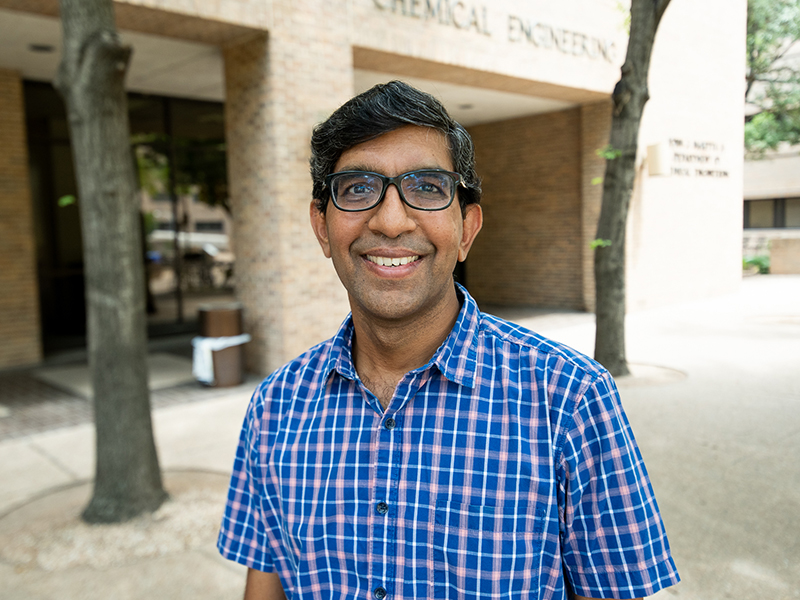Back to Faculty Directory

venkat@che.utexas.edu
512-471-4856
Office Location: CPE 3.414
Venkat Ganesan
Professor
Les and Sherri Stuewer Chair in Chemical Engineering
Research Presentation for Prospective Graduate Students
Educational Qualifications
Postdoctoral Fellow, Materials Research Laboratory, University of California at Santa Barbara (1999–2001)
Ph.D., Chemical Engineering, Massachusetts Institute of Technology (1999)
M.S., Chemical Engineering, Massachusetts Institute of Technology (1999)
B. Tech. in Chemical Engineering, Indian Institute of Technology, Madras (1995)
Research
The chemical engineering science of materials is entering a new era of so-called “designer materials,” wherein, based upon the properties required for a particular application, a material is designed by exploiting the self-assembly of appropriately-chosen molecular constituents. Materials so fabricated (also sometimes referred to as advanced materials), are presently proposed for numerous applications, ranging from photonic and quantum devices to biomedical and tissue engineering applications. My research focus is to develop a theoretical and computationally-based program aimed at elucidating the fundamental mechanisms underlying the design of novel, self-assembled advanced materials. The goal is to complement the research of experimentalists (synthetic chemists, chemical engineers, and material scientists) by providing simple but quantitative guidelines to rationally design and synthesize these materials. Towards this broad objective, our group’s research focuses on the development and use of a wide variety of tools spanning both equilibrium and nonequilibrium statistical mechanics, conventional fluid mechanics, molecular rheology and computational tools to complex fluids and biological systems.
A common theme that has pervaded most of our research has been the multiscale approach. Quite often in the systems we are considering, and for the properties we are interested in predicting, modeling descriptions at a single scale (either molecular or continuum) do not typically suffice or even exist. Our research focuses on using either computational approaches (combining molecular simulations with continuum level numerical methods) or statistical mechanical models to link the molecular details of the components to macroscopically measurable and tunable properties. Within this broad theme, the problems we work on are typically characterized by experimental accessibility (i.e. for issues which are either currently of experimental focus and/or experimentally testable) and impact on practical applications. In this manner, our results and models relate to “real world” phenomena, thereby providing graduate students with a plethora of career opportunities at the end of their research. More details on the current projects, as well as some of the past and future directions can be found in the research webpage here.
Besides the theoretical investigations in our group, our group’s research involves strong interactions with other leading experimental and theoretical groups in polymers and complex fluids around the world. These include researchers at UCSB, Berkeley, MIT, RPI, Rice University, Saclay (France), Bielefeld (Germany) and Indian Institute of Science (Bangalore), as well as with a number of other researchers around the world. Closer to home, our research group also interacts strongly with other experimental groups with UT Austin, including, Profs. Peter Green, Lynn Loo, Donald Paul and the theoretical groups of Profs. Dima Makarov and Tom Truskett. These strong interactions have created unique opportunities for graduate students interested in pursuing research which either involves an experimental component and/or involves interacting with experimentalists working on related issues.
We are always on the lookout for motivated undergraduate students (with strong analytical and theoretical research interests) who are interested in pursuing graduate research. Further, we are also looking for exceptional graduate students interested in postdoctoral research opportunities. If you are interested in either pursuing graduate or postdoctoral research please contact Prof. Ganesan by email (venkat@che.utexas.edu) with the appropriate information on your background and records.
Awards & Honors
- John H. Dillon Medal, American Physical Society, 2009
- Alfred P. Sloan Foundation Fellow, 2004-2006
- NSF Career Award, 2004-2009
Selected Publications
- Self Assembly of Rod-Coil Block Copolymers, V. Pryamitsyn and V. Ganesan, J Chem. Phys., in press (2004).
- Dewetting of Polymeric Films: Unresolved Issues, P. F. Green and V. Ganesan, Eur. Phys. J. E, In press (2004).
- Dynamical Mean-Field Theory for Inhomogeneous Polymeric Systems, Venkat Ganesan and V. Pryamitsyn, J. Chem. Phys.,118, 4345 (2003).
- Field Theoretic Computer Simulation Methods for Polymers and Complex Fluids, G. H. Fredrickson, V. Ganesan and F. Drolet,Macromolecules, 35, 16 (2001).
- Model for the rheology and nonlinear response of layered materials, V. Ganesan and G. H. Fredrickson, J Rheol., 45, 161 (2001).
- Reactions in microemulsions: Effect of thermal fluctuations on reaction kinetics, V. Ganesan and G. H. Fredrickson, J Chem. Phys., 113, 2901 (2000).
- Dynamics of two-phase fluid interfaces in random porous media, V. Ganesan and H. Brenner, Phys. Rev. Lett., 81, 578 (1998).






